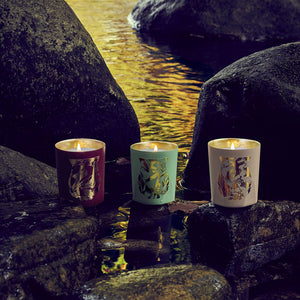



ARQUISTE A GROVE BY THE SEA 100ml
A GROVE BY THE SEA
Adriatic Aromatic
Picture a sunny island in the Adriatic, a small harbour with stone houses and fig and olive groves, surrounded by verdant hills of Mediterranean pine tree, strings of cypress and wild herbs throughout. A window into an evergreen, aromatic landscape of Adriatic fig, dried pine needles, wild rosemary, thyme and the subtle, nutty scent of olive oil.
A green and aromatic fig fragrance transporting you to the aromatic island of Lopud, Croatia.
History
August 1508, Lopud Island, Adriatic Sea
Lopud is an evergreen island with lush fig and olive groves by the sea. From the port, dotted with Renaissance stone villas, the scent of fig and crushed olives is so strong that the salty sea breeze carries it beyond, towards forests of Mediterranean pine and cypress. Above, ancient chapels overlooking the harbour like sentinels are overgrown with wild thyme, fennel and rosemary. The whole landscape an aromatic paradise of green fig, dried pine needles, wild herbs and the subtle, nutty scent of olive oil.
Developed with Rodrigo Flores Roux.
TOP NOTES
Adriatic fig leaves
Black olive
Fleur de sel accord
Croatian clementine
HEART NOTES
Extra virgin olive oil accord
Ripe fig fruit
Thyme essence
Rosemary essence
BASE NOTES
Mediterranean pine needle
Fir balsam
Mediterranean cypress
Red clay
===============================================
More research
- Lopud, one of the three main islands in the Elaphiti archipelago, a 45-minute boat ride from Dubrovnik. Called Isola di Mezzo back when Dubrovnik was the Republic of Ragusa, Lopud sits between Šipan and Koločep, two other evergreen islands. Covered in pine, cypress, overgrown olive groves and fruit orchards, they’re dotted with abandoned Medieval and Renaissance-era stone villas and farms that provided the sustenance for the prosperous old Republic. Lopud suffered an earthquake in the 17th century that left it largely abandoned and untouched until the 20th century. Since then, day trippers come to enjoy quiet, clear waters and perfect sand at Sunj bay, then leave the island to the locals and a small community of expats who have restored the old stone houses along a hill near the Franciscan monastery, once the centre of life on the island.
- Purchased by the Republic of Dubrovnik in the 11th century, Lopud became a seat for the republic’s governor in 1459 and many noble families built summer estates here. By the 17th century, 14,000 people were living on Lopud where the shipping industry and sea trade was flourishing. Sadly when the earthquake of 1667 hit, the island was never again able to attain its former glory and today less than 300 people live on the island.
- The Franciscan Monastery was founded in 1483 on the east side of the island overlooking Lopud bay. By the end of the Croatian War of Independence in 1995, the site was home to a functioning church amidst ruined buildings, former gardens, an unused fortress, and vacant land. Earthquakes, fire, and abandonment had undermined the site's survival, weakening the walls and encouraging rampant vegetation growth.
- For a long time Lopud was known as the island of "Sea Captains", the birthplace of the most famous seafarers in the Dubrovnik Republic. In the past, it was the summer residence of ancient aristocracy and today you can still admire these ancient fortifications and medieval churches, a visible sign of the historical importance of the island.







